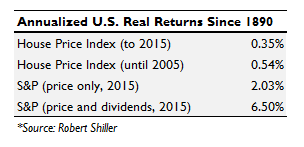 |
| Ted Nasmith, An Unexpected Morning Visit |
"Why not just get a mortgage and buy the place rather than throwing money away on rent?" That's what people often say to folks like me who rent rather than buy. This post is my response.
Let me start off by saying that I'm neither a housing bear nor a bull. I have no idea which way Canadian real estate prices are going to go. My decision to choose renting over ownership has to do with other factors.
I don't have enough resources to buy a house or condo without getting a mortgage. Those who tell me I'm throwing my money away on rent and should buy are implicitly counseling me to take on a lot of leverage. Let's pretend that I'm comfortable accepting that level of debt. Why should I purchase a home with the borrowed funds and not buy some combination of the Vanguard Total World Stock ETF and the Total International Bond ETF?
To favor a home over the Vanguard ETF option is to assume that the risk-adjusted total return on the home exceeds that of the ETFs. Let's unpack this comparison a bit. ETFs provide a return that is purely pecuniary; some combination of price appreciation, interest, and dividends. Homes also provide a pecuniary return—they can appreciate in value. But a home is special. In addition to the pecuniary return, it simultaneously offers a non-pecuniary return, namely shelter. We can't eat in an ETF, or sleep in it, or entertain friends in it, but we can do these things with a house.
The total return on a home should be about equal to ETFs. Markets are competitive, after all, so if one asset offers an excess return, people will compete to harvest those gains, eventually arbitraging them away. Thus the total expected dividends, interest, and price appreciation from an ETF should be about equal to the sum of a home's expected price appreciation and the value of the shelter it provides. Shelter is a sizable service. This means that a home's expected life-time price appreciation needn't be very large to attract buyers. So an ETF's expected return will exceed a home's potential for price appreciation by a significant wedge. This wedge is the extra pecuniary return on ETFs held.
How big is the wedge? We can try to get a feel for it by looking at long term data. Using numbers compiled by Robert Shiller, I've calculated annualized real returns (i.e. adjusted for inflation) for both U.S. homes and equities going back to 1890. I don't have data that would approximate the Vanguard Bond ETF, and I don't know of any comparably long Canadian data series.
Equities, as represented by the S&P, have provided a real return of 6.5% per year including price appreciation and reinvested dividends. Shiller's U.S. housing price index has yielded a much smaller 0.35% annualized real return over the last 120 years. Even if we omit the brutal credit crisis years of 2006-2015, U.S. homes still only provide a 0.54% return.
So when anyone boasts that unlike me they're not wasting money on rent, I accuse them of throwing away the extra wedge they could be earning by owning Vanguard ETFs.
Anyone who borrows to harvest the extra wedge on ETFs is left with a problem, however. They can't just sleep on the street, they need to acquire shelter. We're all born with a short position in housing. And that means giving up part of the excess wedge to a landlord. How much of this wedge? Again, since markets are competitive, my bet is that pretty much all of the wedge will have to be forfeited. If there was a significant chunk left over, everyone would choose to rent, driving rents higher until returns had equalized. At the end of the day, there probably aren't significant excess returns to be harvested by either home ownership or renting/investing in ETFs.
There are a few other stylized facts that colour the rent versus buy decision. Buying and selling a home will set you back thousands of dollars in transaction costs whereas it costs less than $25 to buy and sell ETFs. Secondly, a Vanguard ETF can be sold in a few seconds; a home can take weeks. Lastly, it costs just a few basis points to maintain an ETF (think management fees) whereas a house can cost thousands to keep in shape. To compensate for all these drawbacks (which are sizable), a home must offer a pretty high expected return.
What ultimately tips me towards the ETF option is the opportunity for diversification. Leveraging up on a single asset exposed to one street in a single city is a gamble. The two Vanguard ETFs, on the other hand, offer global exposure to thousands of different businesses, both large and small. Between renting and buying, renting seems to me to be the more prudent approach. I'm no gunslinger.
Which leads me in a meandering way back to Robert Shiller, specifically his derivatives markets for home prices. I'd certainly reconsider the home ownership route is if I could hedge away some of the risk of housing price declines, say by swapping out exposure to changes in the price of my home for a more diversified return. Most attempts to create housing derivative markets have failed, so until we have a futures market in housing prices, give me ETFs.
Related Posts

Subscribe Our Newsletter
